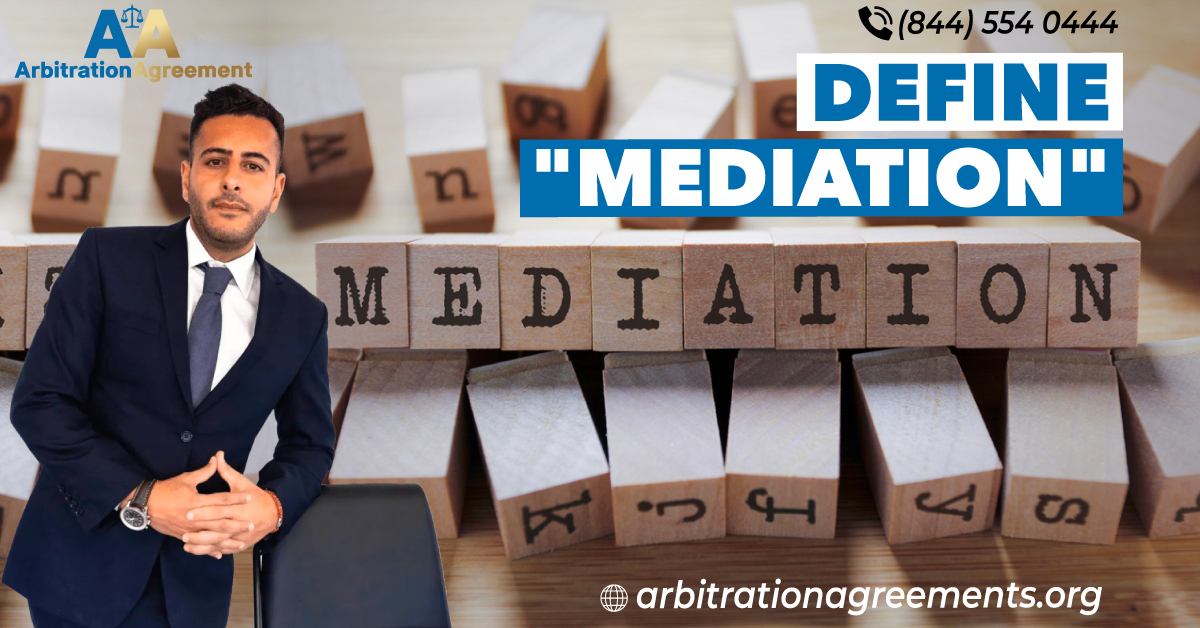Define Mediation
Nitin Paul Harmon
Dec. 4, 2023, 11:05 a.m.
...
Nitin Paul Harmon
Dec. 4, 2023, 11:05 a.m.
...
Before we dive deep into the world of alternative dispute resolution and define mediation, let's lay a solid foundation. So, what is mediation? If you peruse a dictionary, you'll come across a definition akin to: "a process for settling conflicts in which an impartial third party aids the conflicting parties in reaching a mutually agreeable resolution." In simpler terms, mediation is like having a neutral friend step in to help two buddies sort out a disagreement.
The age-old adage, "Would you rather go to court or make peace?" rings true here. If given a choice between a tedious court battle and a calm, resolution-focused discussion, most of us would probably choose the latter. Know what isArbitration Provision 101 And Arbitration Clause & Provision? That's essentially the difference between court litigation and mediation.

Now, you might be thinking, "All of this sounds great, but how exactly does mediation save me time and money?" Let’s break it down.
Mediation, by its very nature, is streamlined. Read more about the Arbitration Agreement Meaning & What is Arbitration Law. Instead of waiting for court dates, dealing with layers of legal bureaucracy, and navigating a maze of formal procedures, mediation brings the involved parties straight to the table for a focused discussion. This direct approach considerably speeds up the resolution process.
Financially speaking, the quicker resolution time in mediation directly translates to fewer expenses. There’s no need to pay lawyers for extended court appearances or deal with escalating court fees. Also, let's not forget the indirect costs saved – like time off work or potential lost business opportunities during prolonged litigation.
At its core, mediation is about communication, understanding, and finding a middle ground. It's an acknowledgment that while disagreements are natural, there are better ways to resolve them than by battling them out in a courtroom.
One of the most significant aspects of mediation is the human touch. Mediators are trained not just to understand the legal or technical details of a dispute but also to appreciate the emotions and perspectives of the individuals involved. By acknowledging and addressing these emotions, mediation can often unearth underlying issues that might not be immediately evident. Know more about arbitration agreement associations and arbitration legal experts. This holistic approach ensures that solutions aren't just superficial but get to the root of the problem.
Where litigation often ends with a winner and a loser, mediation strives for win-win solutions. By focusing on collaboration rather than confrontation, it encourages parties to work together to find resolutions. Know about Arbitration Definition Economics. This collaborative approach often leads to more innovative and satisfying solutions than a strictly legal judgment might provide.
Now, it's essential to understand that while mediation offers many benefits, it might not be the right fit for every dispute. But it's perfect for situations where:
Over the years, mediation has evolved from an alternative dispute resolution mechanism to a primary one for many people and institutions. Its success stories have spurred its adoption in various sectors – from family disputes to corporate disagreements.
Moreover, many legal systems around the world now actively encourage or even mandate mediation in certain cases before they're allowed to proceed to court. Know about The Federal Arbitration Act Meaning. This shift recognizes that a collaborative approach can be more beneficial for everyone involved.
Often, when trying to understand a concept, we turn to dictionaries for a concise, clear definition. When it comes to mediation, most dictionaries offer a definition along these lines: "the act or process by which a neutral third party intervenes between parties in conflict to promote reconciliation, settlement, or compromise." While this definition provides a good starting point, as with many concepts, the true essence of mediation goes beyond just these words. What Are the 4 Types of ADR?
Mediators are like peacekeepers, stepping in to bridge the gap between two conflicting parties. But how exactly do they go about it?
Mediation, in essence, is a collaborative approach to resolving disputes. While a dictionary might define it as a process involving a neutral third party to promote reconciliation, it’s so much more in practice. It’s about understanding, communication, and finding mutual ground.
Mediators play the crucial role of facilitators, guiding conflicting parties through a journey of understanding and compromise. Learn about the Basics of Arbitration & Litigation. They don't impose decisions; instead, they help parties arrive at their own solutions.
In a world where conflicts are inevitable, mediation offers a beacon of hope. It shows that even in disagreements, with the right approach and mindset, we can find harmony and mutual understanding. Know Quick Guide to Arbitration Law. Whether you’re dealing with personal disputes or professional ones, remember that mediation provides an avenue where voices are heard, relationships are valued, and resolutions are collaboratively crafted.
Mediation isn’t just an alternative to court litigation; for many, it's a preferable first choice. Know What is Mandatory Arbitration. Its flexibility, cost-effectiveness, and emphasis on mutually beneficial solutions make it an attractive option for those seeking to resolve disputes in a harmonious manner. Learn about Insurance Arbitration.
In the end, it's about what you value more: dragging out a disagreement in a formal, expensive, and public setting or resolving issues amicably, quickly, and cost-effectively. If the latter sounds more appealing, mediation might just be the path for you.